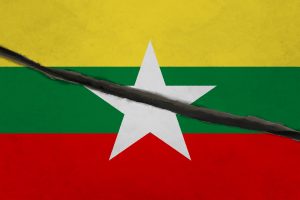The recent visit by Mirjana Spoljaric Egger, the president of the International Committee of the Red Cross (ICRC), to Myanmar and her subsequent meeting with Senior General Min Aung Hlaing in Naypyidaw is only the latest in a series of deeply flawed engagements with the military. These consultations risk legitimizing a brutal regime that has a long history of evading consequences for its appalling human rights record, including perpetrating a genocide against the long-persecuted Rohingya.
The trip by the ICRC came just over a week after the junta dropped two 500-pound bombs on internally displaced persons (IDPs) in the Bangkok IDP Camp in Pekon Township, southern Shan State. Among those killed were women and children. The airstrike was the seventh that targeted the IDP camp, in addition to dozens of other attacks that included an aerial bombardment on a school in Daw Si Ei village in February, which killed four children.
After the discussions with the ICRC, Myanmar’s state-controlled media published an article stating that the meeting was not held to negotiate aid access in Rakhine State, as the ICRC claimed, but to insist that the regime is upholding the principles of the Geneva Convention. It should not be surprising that the junta weaponizes these interactions for its own gain and propaganda.
The assumption that a meeting with the military would result in any progress shows a lack of awareness or regard for the politicization of aid. As the independent analyst Adelina Kamal makes clear, “this vertical, top-down, ‘neutral’ approach to aid access taken by many international actors may deepen the conflict.”
This point is further emphasized by Khin Ohmar, a long-time, esteemed rights defender, who says there is nothing neutral about engaging with the Myanmar military. A stance of neutrality is particularly perilous when dealing with a junta that consistently violates human rights.
Any formal or informal engagement with Myanmar’s junta is an embarrassing display of willful ignorance and negligence that could compromise the integrity and dignity of beneficiaries. It also undermines the agency of local organizations, which do not need to negotiate with terrorists to carry out a meaningful and coordinated emergency response. These engagements also conveniently overlook the junta’s track record, which includes decades of authoritarian rule that has suppressed fundamental rights and freedoms and sought to advance a misogynist agenda that denies women protection and participation.
The ICRC claims to be “neutral, impartial and independent,” but the Myanmar ICRC (MRCS) has a disturbing track record for working with the military. The MRCS has been integrated into the Myanmar Army’s structure since 1996, and alarmingly, current MRCS Executive Committee members formerly held military positions.
In 2021, over 400 civil society organizations issued an open letter strongly condemning the MCRC’s attendance at the junta’s Armed Forces Day reception. Their attendance came less than three months after the coup, which saw a violent response by the junta that included open firing on peaceful protesters.
Earlier this year, the Central Executive Committee of the Karen National Union addressed the involvement of the MRCS in working alongside the Royal Thai Government and the military junta in distributing humanitarian aid to Karen State. They stated: “Providing aid through the MRCS is showing an indifference to the suffering of the people because MRCS is working for SAC that deliberately targets its own people.”
The solution for aid access is building meaningful relationships with local organizations working in remote, hard-to-reach areas. Funding can bolster their operations and security needs while supporting humanitarian initiatives through cross-border aid. Localized assistance is a proven pathway to ensuring support reaches those most in need. For more than 30 years, local service providers and groups have successfully delivered aid without junta approval.
In fact, the very services that Spoljaric, the ICRC president, stated are inaccessible due to conditions and restrictions imposed by the junta, are being filled by local service providers who do not adhere to the limits imposed by the military. Waiting for permission to act to save the lives that the Myanmar military has jeopardized is costly and ineffective, and there certainly is no time to waste.
International organizations should focus on strengthening local networks and providing cross-border aid rather than waiting for authorization from the junta to operate in conflict zones. Given the Myanmar military’s neglect of civilians, it is simply unrealistic to think that any relationship with them will improve humanitarian access.
Good intentions are not enough to solve the many human rights crises unfolding throughout Myanmar and within the borderlands. These visits do an injustice to the courage and adversity of local humanitarians and rights defenders, many of whom are from women-led organizations. Rather than shaking hands with the devil, international leaders must accept that their impartiality is not saving anyone.

































